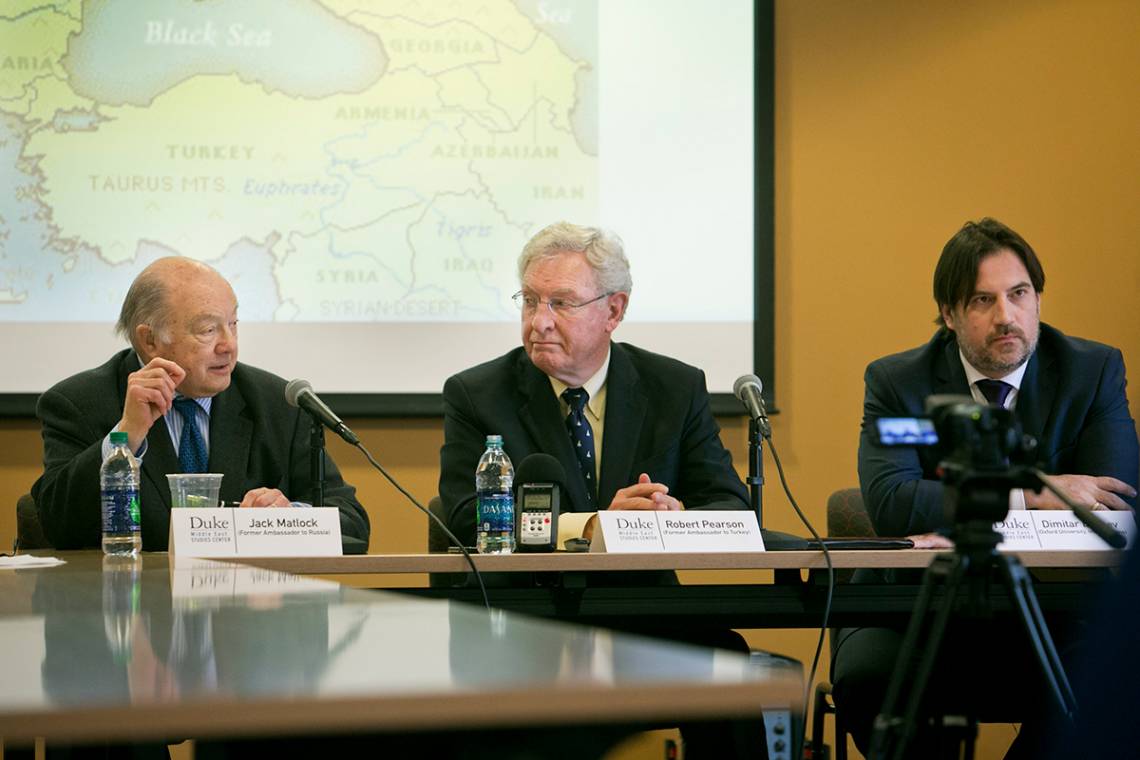
As a major international actor, Russia has a weaker hand than the United States – a smaller economy, population and military might – but often appears more powerful because “it plays it very well.”
That assessment, shared Friday by Dimitar Bechev, director of the European Policy Institute, a think-tank based in Sofia, Bulgaria, was part of a discussion at Duke on Russia-Turkey relations.
“The Grey Wolf & Bear: Turkish-Russian Relations” also included insights from Duke Rubenstein Fellow Jack Matlock, U.S. ambassador to Russia under President Reagan, and Robert Pearson, former U.S. ambassador to Turkey and now a non-resident scholar at The Middle East Institute in Washington, D.C.
Russia and Turkey have cozied up in recent years, especially over mutual interests in the Syrian civil war. Speakers at Friday’s talk at the Forum for Scholars and Publics described the Russia-Turkey relationship as a “marriage of convenience.”
That’s largely because of an opening created by the United States’ often demeaning portrayal of Russian President Vladimir Putin combined with Turkey’s anti-U.S. rhetoric and actions under hardline leader, President Recep Tayyip Erdoğan, they said.
President Obama hurt the United States-Russia relationship, in part, by calling Russia a regional power that doesn’t make things people want, Matlock said. Language like that was unnecessary and stiffened Russian resolve to assert itself as an international force.
And Turkey viewed Obama’s failure to act on the “red line” he set against Syrian President Assad’s usage of “chemical weapons” as a major failure, Pearson said.
As a result, “The Turks, in my opinion, gave up on the United States as a reliable ally to overthrow Bashar Assad …,” he said.
He added: “Russia … agreed to let Turkey use (air) bases to help split Turkey from the United States.”
Matlock said the U.S. government and media continually reflect a “demonization of Putin.”
Even during the cold war, the Soviet Union and U.S. looked for ways to cooperate, Matlock said, adding that treating Russia like the enemy only hinders this possibility today.
“The Russians see our policies as not only wrong but as put downs,” Matlock said, noting that Russia often views the United States’ idea of a partnership as we give orders and you follow.
Russia, Turkey and Iran have been in talks in recent months related to the nearly seven-year-old war in Syria, but the process is complicated by their backing of rival sides.
Asked if NATO might kick Turkey out of the alliance for its crackdowns on democracy and other hardline actions against Kurds and others, Pearson noted there is no kick-out clause in the NATO treaty.
“The U.S. has no intention of promoting, insinuating or hinting that Turkey should leave NATO,” he said.
Russia, Pearson said, wants to get its troops out of Syria, while Iran thrives on creating chaos in the Middle East. For that reason, Russia, the United States and Turkey have plenty to gain by working together on bringing stability to the region.
Friday’s talk was co-sponsored by the Duke University Middle Eastern Studies Center (DUMESC), the Center for Slavic, Eurasian, and East European Studies, the Center for International & Global Studies, the Department of Political Science and the Forum for Scholars and Publics.